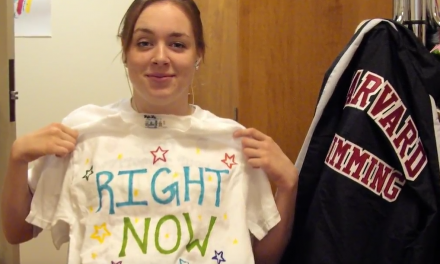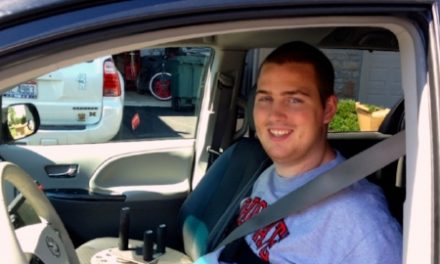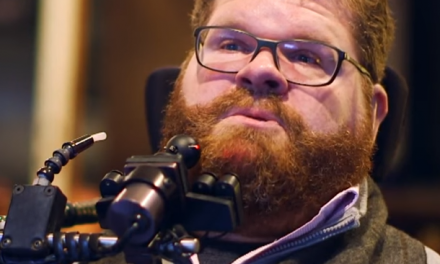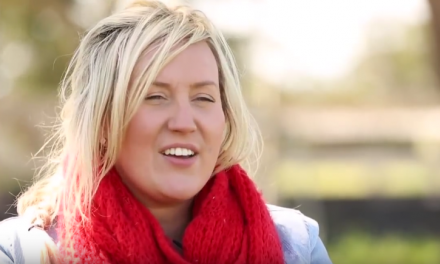On September 4, 1990, at the age of 11, Ellison was hit by a car while walking home on her first day of junior high school, resulting in her being paralyzed from the neck down. Although Ellison received several new disabilities including the fact that she was completely dependent on other people, she continued to get excellent grades and graduated from Ward Melville High School with high honors, and was accepted by Harvard. She graduated magna cum laude from Harvard with a bachelor of science in cognitive neuroscience in 2000, and a master’s degree in public policy from Harvard’s Kennedy School of Government. In 2014 Rutgers University awarded Brooke Ellison with an honorary doctorate in humane letters.[2] Ellison completed her Ph.D. in 2015 from Stony Brook University.[3]
In November 2015, Ellison teamed up with director James Siegel to create the winning documentary “Hope Deferred”,[4] which aims to educate the general public about embryonic stem cell research.
The Brooke Ellison Story
Ellison was portrayed by Lacey Chabert and Vanessa Marano in The Brooke Ellison Story. The 2004 television film was directed by fellow quadriplegic Christopher Reeve, star of Superman. It is also notable for being Reeve’s final directing project. The film aired after Reeve’s death.
The Legacy of Brooke Ellison
When you become a member of the spinal cord injury community there are people you’ll come across that you’ll never forget. Brooke Ellison, paralyzed when she was just 11 years old, is one of these amazing human beings. Resilient, wise and forever hopeful, she dedicated her life to finding a cure for paralysis. And while she may have passed away before that goal come to fruition, she will forever be recognized as one of the most fearless fighters for stem cell research in the search for a spinal cord injury cure.
Paralyzed, Then Harvard-Bound
Born and raised in Rockville Centre, New York, Brooke became paralyzed at 11 years old at the start of 7th grade crossing the road on the way to school. She became a vent-dependent quadriplegic in the aftermath, but Brooke was undeterred, and returned to high school, graduating in 1996 with honors.
After high school, Brooke had her choice of colleges and made the history-making decision to attend Harvard University, becoming the first quadriplegic to be accepted and graduate from this prestigious school. Brooke’s mom Jean also came along for the ride, living with her during her 4 years in undergraduate school as her full-time caregiver, and helping her years later as well, getting up with her in the early hours to make her classes, and eventually her job.
After college graduation in 2000, Brooke wrote a memoir on her experiences at Harvard and prior, detailing going through becoming paralyzed. It was published in 2002 and was titled Miracles Happen: One Mother, One Daughter, One Journey, and it even caught the eye of Christopher Reeve, who had a similar injury to Brooke’s.
Reeve wanted to return to the film industry as a director and chose Brooke’s life story as the basis of one of the films. It was titled The Brooke Ellison Story and premiered in October 2004. Unfortunately, Reeve never saw the debut of this film, as he passed away a few weeks prior to the premiere. Thankfully, he was able to finish the film and introduce the world to Brooke’s powerful story before his death.
Senate Run, and Her Last Book “Look Both Ways”
The irony of Brooke’s film is that there should be a Part II because her life only got more interesting after the movie. Brooke went on to become a serious stem cell research advocate, dedicating her life to changing the perception of life-saving science. From 2007-2014, she was on the Empire State Stem Cell Board, which designed New York state’s stem cell policy, and she was on the advisory board for the Genetics Policy Institute.
In 2006, Brooke, at just 28 years old, made the decision to run for New York State Senate as a Democrat and became the first person to use a ventilator to run for that high of office in the US government. Her challenger was John Flanagan, the Republican incumbent. Unfortunately, he won with 59% of the vote. Brooke’s platform issues were embryonic stem cell research, education, affordable housing, and creating jobs and economic opportunity.
Brooke also teamed up with director James Siegel in 2015 to make the documentary Hope Deferred, which shared truths about embryonic stem cell research. And she decided to get her Master’s in public policy at the Harvard Kennedy School of Government, eventually getting her PhD in Sociology from Stony Brook University.
Outside of being an author and her political aspirations, in 2018 Brooke became an Associate Professor at the School of Health Technology and Management at Stony Brook University, teaching health policy and medical ethics. She was able to connect with her students in a special way because of her disability, even having one class assist her in building a 360 degree camera so she could see her cat from her wheelchair.
And Brooke’s last book before her death, published in 2021, was titled Look Both Ways. A book she considered her most important, it retells her life story, but as Brooke states, it retells her story in a new way as she shares the many important life lessons she learned after first book in 2002; lessons that relate to fully accepting herself as a woman with a disability. All of this wisdom and more she incorporated into her final book.
In Brooke’s own words (from her site) on the importance of her book, Look Both Ways:
“20 years ago, I could not have written LOOK BOTH WAYS. 20 years ago, even though I had lived 10 years with quadriplegia, I still didn’t know what it meant to be disabled or how to understand myself as a woman with a disability. It took time. It took time for me to understand how disability becomes incorporated into someone’s identity and that this frames how you not only engage with the world but also how you see the world. Until a shift in my thinking took place – until I could see myself as a woman with a disability who is stronger, braver, more creative, more compassionate, and more badass as a result of it – there was no way that I could properly articulate what the true story of my life has been.”
Source: Spinalpedia




